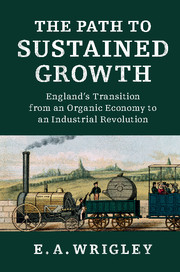 The Path to Sustained Growth
The Path to Sustained Growth Book contents
- Frontmatter
- Dedication
- Contents
- List of figures
- List of tables
- Acknowledgements
- Introduction
- 1 Organic economies
- 2 The classical economists
- 3 Energy consumption
- 4 Urban growth and agricultural productivity
- 5 Changing occupational structure and consumer demand
- 6 Demography and the economy
- 7 Transport
- 8 England in 1831
- 9 The completion of the industrial revolution
- 10 Review and reflection
- Bibliography
- Index
1 - Organic economies
Published online by Cambridge University Press: 05 January 2016
- Frontmatter
- Dedication
- Contents
- List of figures
- List of tables
- Acknowledgements
- Introduction
- 1 Organic economies
- 2 The classical economists
- 3 Energy consumption
- 4 Urban growth and agricultural productivity
- 5 Changing occupational structure and consumer demand
- 6 Demography and the economy
- 7 Transport
- 8 England in 1831
- 9 The completion of the industrial revolution
- 10 Review and reflection
- Bibliography
- Index
Summary
Before the industrial revolution all human societies laboured under a common constraint in attempting to increase their ability to produce even the basic necessities of life. Their degree of success in this regard varied enormously. It might seem ridiculous to regard those living in Renaissance Italy as similarly placed to the early tribes of hunter-gatherers. In many contexts such an assertion is indeed ridiculous; but in seeking to put into perspective the radical nature of the change implied by the occurrence of an industrial revolution, it is instructive to explore the sense in which the assertion is justified. All life on earth is dependent on the process of plant photosynthesis, by which a fraction of the energy reaching the surface of the earth from the sun is captured by plants. The energy thus captured creates the base of the pyramid comprising all life forms as, for example, in providing food for herbivores and therefore also indirectly for carnivores. Plant photosynthesis, however, captures only a tiny fraction of the energy contained in incident sunlight. One estimate suggests that 400,000 kilocalories of solar radiation reach each square metre of soil annually, of which 4,000 kilocalories, or 1 per cent of the energy involved, is translated into vegetable matter. Other estimates suggest a lower figure. Pimentel indicates the wide range of efficiency with which different crops capture the energy from sunlight: maize captures 0.5 per cent, wheat only 0.2 per cent. White and Plaskett calculate that the total of solar energy arriving on the surface of the United Kingdom from the sun each year translates into the equivalent of the energy contained in c. 26 billion tons of coal, an enormous figure, many times greater than current national energy consumption, implying that a total for England and Wales alone the figure would be perhaps c. 16 billion tons. Assuming an average efficiency of energy capture of 0.35 per cent, this suggests that the equivalent of the energy in 56 million tons of coal might have been secured from the products of plant photosynthesis in early modern England and Wales.
There are wide bands of uncertainty round any estimates of this kind. It is clear, however, that in reality the energy limit imposed by plant photosynthesis on the English economy was very much lower than any suggested in the last paragraph.
- Type
- Chapter
- Information
- The Path to Sustained GrowthEngland's Transition from an Organic Economy to an Industrial Revolution, pp. 7 - 18Publisher: Cambridge University PressPrint publication year: 2016


